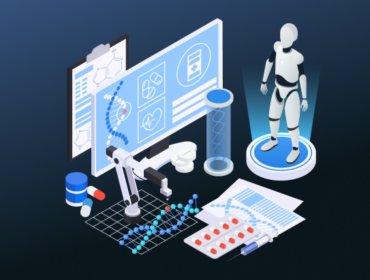“Data is king.” We’ve heard this phrase so many times during the past decade that it has become axiomatic (and boring). Still, taking advantage of the data you collect isn’t easy. What’s more, valuable insights risk remaining untapped with overwhelming volumes of data, the challenge of transforming unstructured data into a machine-readable format, and the lack of data scientists.
Luckily, there’s a solution: using artificial intelligence in business intelligence can be the game changer here — just see what the process of detecting anomalies in real-time within an AI-based threat detection solution looks like

Whether you are looking to go beyond the basic understanding of the BI-vs-data science difference and implement an AI-powered solution to augment your BI efforts, this article is for you. You’ll learn about the benefits of artificial intelligence in business intelligence, use cases, and the most popular solutions.
What Happens When Business Intelligence and Artificial Intelligence Meet?
Basically, business intelligence and AI are like two puzzles that ideally complement each other, with AI augmenting the capabilities of BI. Here’s how.
AI is known to be capable of performing tasks that human intelligence can do — such as visual and auditory perception, natural language processing, pattern recognition, and decision-making — but much faster and at a larger scale. For business decision-makers, this is a real godsend. AI-enabled business intelligence tools can analyze large amounts of data in real-time, generate insights from unstructured information, anticipate trends, and make recommendations on future actions.
AI-BI collaboration comes in different forms and shapes. Augmented analytics (AA) is worth paying special attention to. Unlike some other AI-driven approaches, AA doesn’t aim to take us, humans, out of the decision-making equation. Instead, it enhances our ability to make use of data, automating routine manual tasks across the data analytics lifecycle and thus, shortening the time between the moment you collect data and act on it. Augmented analytics is also known for democratizing data and reducing the time needed to build ML models.
Now that you have a basic understanding of how AI is transforming BI, let’s see which benefits for a business this combo can translate into.
The Benefits of AI in Business Intelligence
While the impact of data science on businesses is huge, artificial intelligence is becoming a must-have element of today’s business intelligence. Facebook, Amazon, Alibaba, and other top players have already weaved it into their business decision-making.
Here are a few benefits of AI in BI.

Improved decision-making
In the PwC 2022 AI survey, 41% of AI leaders (companies that effectively use the potential of AI) agree that artificial intelligence improves their decision-making. And it’s hard to argue with that point because:
- AI can analyze broader data sets, enabling it to detect patterns otherwise invisible and tap into previously unexplored data sets.
- Unlike a human analyst, AI can’t “overlook” anything in the data it’s fed to — a favorable ground for informed decisions with a minimized chance for error.
- AI analyzes data with lightning-fast speed, allowing for real-time insights.
- Since AI-enabled BI tools can identify trends, they can transform insights into actions.
As a result, AI allows for fast, accurate, timely, and informed business decision-making. Still, the benefits of AI in BI don’t end there.
User-friendly analytics
Deriving insights from charts, graphs, diagrams, and reports has always been daunting. No wonder at least 35% of employees don’t want to delve into the nuances of business analytics, resulting in large amounts of valuable data going down the drain.
Luckily, generative AI is on its way to changing this saddening statistic. For example, ThoughSpot’s Monitor for Mobile sends notifications to its users upon unusual changes in data, explains each change, and even recommends further actions. Tableau GPT doesn’t lag behind here, either — it also uses natural language to help non-technical users generate insights from data.
With such tools at hand, everyone is on the same page, which, in turn, improves decision-making in your company.
Saved human resources
The lack of talent is challenging the data and analytics industry — according to 73% of business decision-makers in the US and Canada.
This issue can be addressed with AI-enabled BI tools capable of quickly drawing insights from oceans of business data at hand. Of course, the final say is still on human decision-makers. But AI can considerably ease this process, sparing you from hiring extra resources to make sure nothing flies under your radar.
Better revenue
Slow or wrong decisions and extra hires to make up for the lengthy, inefficient process of data analysis — both devour your budget. But as you can see from the benefits above, AI is set to address these challenges.
What’s more, with its capability to identify unobvious trends and tap into unstructured data, AI-enabled BI solutions have the potential to identify new opportunities before your competitors do.
Now that you have a basic grasp of the advantages of AI in BI, let’s see the combo in action.
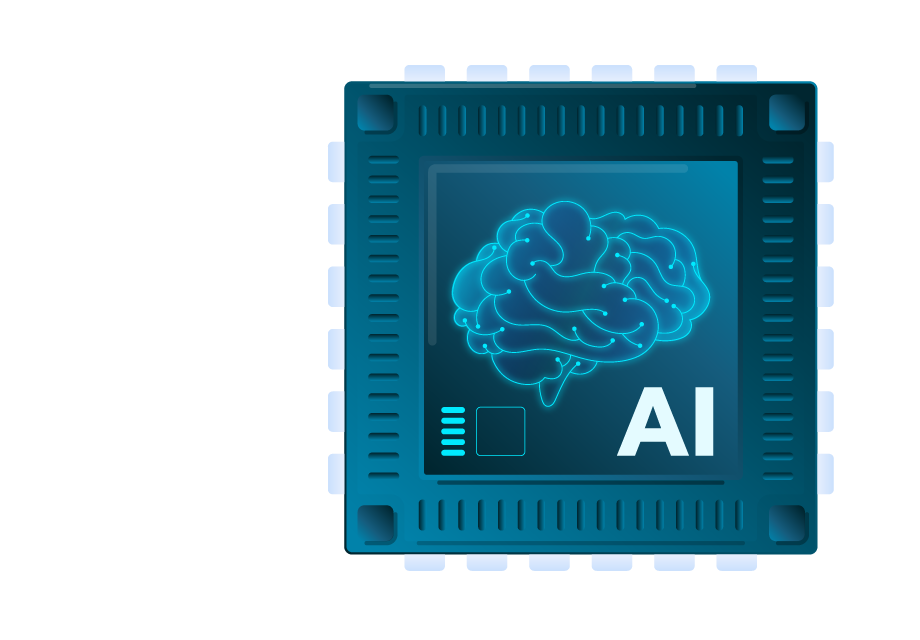
Real-World Applications of AI in BI
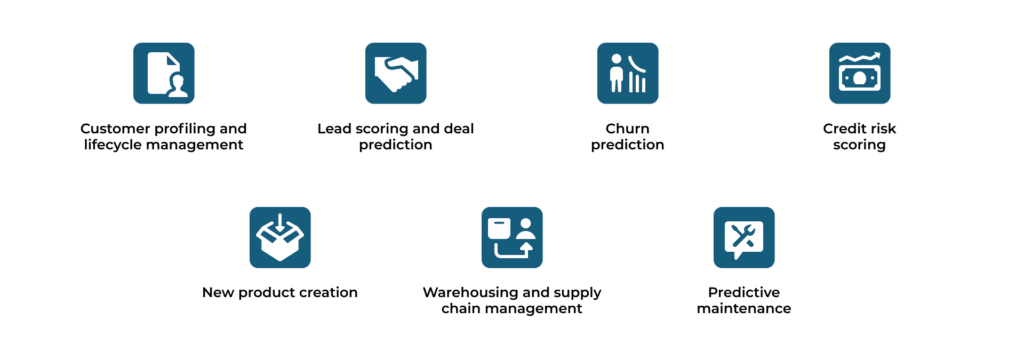
AI is a universal tool, and its potential can span all industries and kinds of business operations that require prompt, accurate decisions.
PwC has found that AI-enabled business decision-making comes in useful operations and maintenance, customer experience, strategy, product and service development, supply chain, workforce management, and other areas, to name just a few.
Not to be unfounded, let’s consider a few real-world applications of AI in BI.
Сustomer profiling and lifecycle management
Understanding your customer is the key prerequisite for any product or service to succeed. By collecting and analyzing data from various resources, AI-powered BI tools can generate an accurate picture of your ideal customer with their pain points, needs, and wants. What’s more, they can help you cluster your audience based on various criteria to offer tailored content, products, and services.
An accurate customer profile can also serve as a basis for customer behavior prediction. Amazon’s “anticipatory shipping” model predicts which items certain customers are likely to purchase before they even place the order and initiates shipping of these products to the distribution centers close to the anticipated buyers. This way the e-commerce giant considerably cuts delivery times.
Lead scoring and deal prediction
AI-enabled BI tools can also lend you a hand in lead scoring and customer segment prioritization. Say, you have several leads but don’t know with which one you have more chances to close the deal. Or your capacity doesn’t allow you to focus on two segments of customers.
Using data like customer lifetime value, previous interactions, and so on, AI can score potential customers based on their probability to convert and recommend you foster relationships with one category over another.
Churn prediction
While AI-powered BI tools are showing good results in predicting customer behavior, they can also assist you in identifying customers that are likely to leave.
Equipped with churn prediction AI models that crunch industry information, as well as data from CRMs, RMS, sensors, and customer analysis tools, BI solutions can calculate the probability and impact of a customer churning and identify reasons for it. Based on this information, businesses can develop targeted and effective countermeasures before it’s too late.
Credit risk scoring
Credit scoring decisions rely on vast amounts of data, such as total income, financial track record, transaction analysis, and employment history. At the same time, distinguishing between trustworthy and unreliable borrowers is indispensable to any financial institution — otherwise, it risks going bankrupt one day.
AI’s capability to quickly process extensive data volumes and point to outliers with utmost accuracy is empowering here. Based on facts, not gut feeling, it can help you decide whether or not to issue a credit or loan, calculate the most optimal credit or loan amount and interest rate, and predict customer income range for segmenting.
New product creation
AI in BI also shines in new product idea brainstorming. Case in point, Unilever. Believe it or not, they arrived at the idea of their infamous cereal-flavored ice cream using AI.
It all started when Unilever found out that there were at least 50 songs in the public domain dedicated to “ice cream for breakfast.” After conducting separate research into the ice cream category with the help of machine learning, the company identified a business opportunity in it — and the fabled “ice cream for breakfast” under Ben & Jerry’s brand has finally seen the world.
Warehousing and supply chain management
Supply chain disruptions and inefficiencies might have severe repercussions for any business. But augmenting business intelligence with AI can appear as a safety lock here.
For example, AI-driven BI solutions can make purchasing decisions based on demand trends and stock levels. This will minimize the chance of running out of stock during sudden demand spikes or vice versa — having oversupply. No wonder high-performing procurement companies are 18 times more likely to have achieved AI maturity than others.
Predictive maintenance
For your business to remain afloat, all critical equipment must always be up and running. And that’s where another use case of AI in BI kicks in — predictive maintenance. Basically, it’s all about the AI’s capability to use sensors and data to predict when a vehicle or a piece of equipment is likely to break down.
Case in point, Škoda Auto. Their AI-based image recognition system called “Magic Eye” continuously monitors the state of the assembly line equipment against the baseline standards and flags anomalies in real-time. This allows the car manufacturer to prevent unplanned failures and to make the best use of their production capacities.
AI for business intelligence translates into lots of advantages. But the key point here is to go for a suitable solution. Let’s give a look at the market leaders.
Top Five AI-Powered Business Intelligence Platforms
As of 2023, artificial intelligence is a must-have element of the business intelligence market. AI-enabled BI isn’t a novelty anymore — the market is brimming with them. Still, we’ve cherry-picked a few top players to give you a general understanding of what such tools can do.
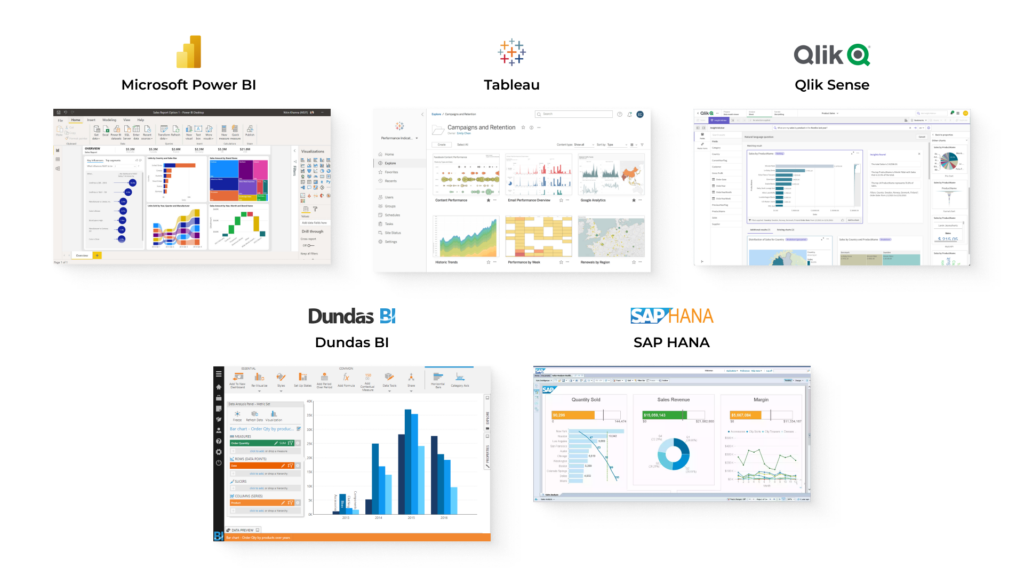
- Microsoft Power BI. Thanks to its image recognition and natural language processing capabilities, the solution can connect to over 70 types of data sources, from social media to factory sources, and visualize insights in user-friendly dashboards in real time. Besides, it allows users to ask questions in natural language to access the necessary data.
- Tableau. It’s one of the most popular business data visualization tools. It can connect to various data sources and generate interactive dashboards. One of its latest enhancements is Tableau GPT. Housed in an interface called Tableau Pulse, the AI-driven solution alerts users on data outliers and surfaces insights using natural language, turning the process of data exploration into a conversation.
- Qlik Sense. According to the 2023 Gartner Magic Quadrant, Qlik dominates the BI market along with Power BI and Tableau. Its AI-driven data visualization solution, Qlik Sense, connects to different data sources, has data preparation capabilities, and allows users to create interactive dashboards — all through a user-friendly UI.
- Dundas BI. This browser-based business analytics tool is known for its high level of interactivity and extensive data visualization capabilities. You can embed Dundas BI into existing web pages and the page of your web application.
- SAP HANA. SAP HANA is an in-memory database with powerful data analytics capabilities, which come in useful in network monitoring, supply chain planning, fraud detection, and beyond. It stands out with its breathtaking performance, able to analyze significant data volumes in real-time. SAP HANA itself isn’t an AI platform, but it can be integrated with other AI solutions (such as SAP Leonardo) for advanced analytics and AI-driven insights.
As you can see, plenty of AI-powered analytics offerings are available in the market. Still, many businesses are still reluctant to incorporate AI into their BI processes. Why? Let’s see below.
What Keeps Some Business Decision-Makers from AI Adoption?
Despite the variety of AI-powered BI solutions, it may happen that you won’t find one that fully meets your requirements. The way-out? There are two of them:
- You can combine two or more solutions to cover all your bases. The option seems to be reasonable at first glance, but it might cost you an arm and a leg as you risk paying for features you never use (and still not having the necessary functionality).
- Building a custom solution will spare you from paying extra. But here’s the rub: if you don’t have the necessary expertise in-house, you’ll need to make for it with additional hires. But this isn’t easy due to the scarcity of AI talent: in Deloitte’s survey, 23% of AI adopters faced significant skill shortages when implementing their initiatives.
Despite the talent shortage challenge that custom AI solution involves, it still seems a decent solution to the lack of tailored offerings in the market. But how do you tackle the shortage? According to Deloitte, businesses normally choose between two options: training their in-house team or choosing a reliable provider of BI development services.
There’s no doubt, the second option will take much less time, effort, and in certain instances, resources. But where do you find a trusted professional? That’s where Unicsoft steps in.
Unicsoft’s Experience
Unicsoft is a reliable software development provider with a proven track record of different project types, including those dedicated to business intelligence like this BI tool for US automotive dealers, with a highly data-rich and user-friendly dashboard:
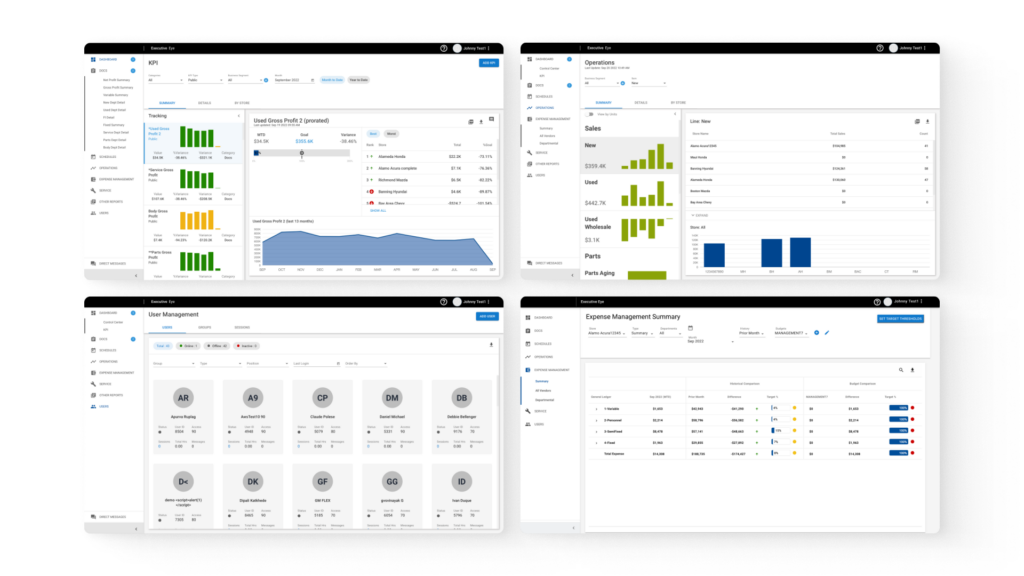
What’s more, artificial intelligence solutions have been the centerpiece of our services since 2015. This means that we can lend you a hand with different AI-in-BI use cases, including customer profiling, lead scoring, deal prediction, credit risk scoring, churn prediction, and beyond — just take a look at our portfolio. We recommend paying attention to:
- An ML model for data breach forecasting with precision amounting to 83%
- AI for cryptocurrency price prediction with 73-90% accuracy of prediction
An ML model for anticipating incidents in a supply chain and logistics processes making forecasts with 80% higher precision than the previous solution
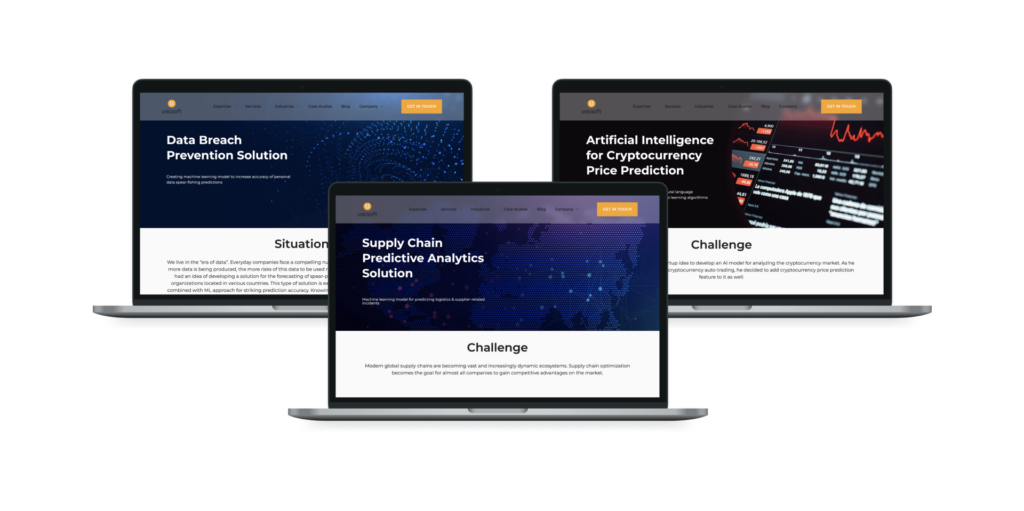
What’s more, artificial intelligence solutions have been the centerpiece of our services since 2015. This means that we can lend you a hand with different AI-in-BI use cases, including customer profiling, lead scoring, deal prediction, credit risk scoring, churn prediction, and beyond — just take a look at our portfolio. We recommend paying attention to:
- An ML model for data breach forecasting with precision amounting to 83%
- AI for cryptocurrency price prediction with 73-90% accuracy of prediction
An ML model for anticipating incidents in a supply chain and logistics processes making forecasts with 80% higher precision than the previous solution
Whether you want to develop a tailored solution from scratch or to integrate a third-party AI-enabled BI tool with your internal system, look no further. We can assist you within different cooperation models: we can take full responsibility for your project, empower your team with additional talent, or consult you on your case.
Conclusion
With its capabilities to sift through extensive amounts of different data types at lightning speed, artificial intelligence can serve as a powerful amplifier of your business intelligence (and digital transformation as a whole) efforts. It can improve your decisions, make the “secret alchemy” of business analysis understandable to users with different levels of data literacy, save your human resources, and spare your budget — all across a vast variety of business cases.
The key point here is to have a reliable solution that suits your business case. The market is brimming with offerings, but if none meets your needs, we can build one for you — so contact us!
FAQ
How can AI be used in business intelligence?
You can take advantage of the AI capabilities in different (if not all) BI cases. Operations and maintenance, customer experience, strategy, product and service development, supply chain, and workforce management are the most popular of them. Unicsoft can assist you with any.
What are the benefits of using artificial intelligence in business intelligence?
First, with the AI’s ability to quickly identify insights from big data and make data science user-friendly, you can considerably improve your decision-making. Second, AI can dramatically cut your HR needs by automating various aspects of BI. Third, AI can improve your ROI as it eliminates inefficiencies, minimizes errors, and helps you uncover new business opportunities.
What are the main trends in modern AI-powered BI?
Research reveals that 35% of employees don’t want to delve into the data science intricacies. As a result, tons of data is going unused, and simplifying business analytics can prevent this. In our opinion, this is one of the main trends in today’s AI-powered BI market.
What is the biggest challenge of implementing AI into the enterprise ecosystem?
Finding skilled professionals that will weave AI into your business intelligence efforts is probably one of the most prominent challenges here. Another problem is to ensure that the new solution seamlessly and securely interacts with the rest of your system. Luckily, Unicsoft can help you address both.




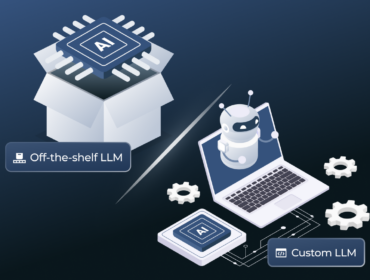
![Artificial Intelligence in Business Intelligence: Taming The Data Overwhelm What’s the EU Artificial Intelligence Act and How to Comply? [Webinar]](https://unicsoft.com/wp-content/uploads/2024/03/Cover_1140_v1.1-370x280.png)
